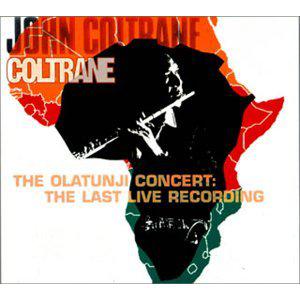
I have literally all of Coltrane's Impulse! label CDs, as well as the vast majority of his recordings for a myriad other labels.
The Olatunji Concert (below reviewed, if you're patient) is Trane's last live recording: he died at age 40 in 1967.
Putting any Coltrane CD/record on is like devout Catholics lighting a censer: I trust it completely.
Coltrane taught me to love jazz (and was my gateway drug to the whole genre, if you will); he is why I play tenor and soprano sax. He is why I play anything but a guitar and drums.
In my mind Coltrane, like early-era Metallica, is the ideal artist:
in the grandest, most pretentious, and most indespensible way possible, he's what all humans should aspire to: he does what he wants, when he wants, in an attempt (however futile or not, depending on your view) to connect to Divinity.
To express himself as purely as possible, and to be heard in this way by others.
So with this first of the posthumous releases (obviously?), we get what is referred to as "late-period Coltrane."
For those of you not up-to-the-minute on jazz mythology (which probably speaks well of you), "late period" Coltrane means free jazz, which means solos as absolutely-goddamn-long-as-we-wanna-take-them.
In all honesty, it means the type of jazz that may've, in some great probability, turned you off of jazz in the first place (if you're not a fan). It means noodling, and annoying effete intellectuals describing using the "negative space" in soloing-- it means balding geeks who majored in music composition talking about "playing what's not there, man...."
Now, you're gonna have to trust me here. But I think I'm onto something, and you might benefit from reading further:
Jazz...
is the greatest form of music-- ever.
Even beyond metal-- and this is from someone who has listened to, for the most part worshipped (and reviewed, as perhaps you've noticed) metal for over 30 years.
I love metal like a mother loves her children-- no hyperbole.
But jazz, real jazz, is music with talented musicians who feel each other's presence like Jean Gray psychically feels Scott Summers-- it's the closest humans get to God Making Sound.
I know: it's quite a claim.
Both 'Trane's grandfathers were preachers-- and I genuinely doubt this is a coincidence. If you listen to a typical interview with him, he sounds like the archetypal preacher-- slow-spoken, contemplative... suggestively all-knowing, yet humble.
I owe a small fortune, the GNP of a small island nation, in student loan debt for my psychology degrees-- but I would punch Carl Jung and Rollo May in the FACE for the chance to talk to John Coltrane, even for a few minutes.
The fact is, I could've review any Coltrane album: for my own site, I've review several of his (in my mind, however limited that may be) better records. But note the cover photo, above: we're talking about a man who made his reputation on playing a particular instrument (the tenor, and later the soprano, sax) and was so debilitated by disease that he couldn't continue to play the tenor sax physically (they usually weigh about 22 lbs) and SO LAID DOWN AND CONTINUED TO PLAY THE FLUTE ON SOME TRACK BECAUSE IT WAS ALL HE COULD PHYSICALLY LIFT.
This fact embarrasses me when I complain about my callused hands from playing the guitar.
The wailing, the noise from the tenor, pushes you towards some questions:
is it clinically interesting, as in "so this is what a psychotic break sounds like?";
is it viscerally interesting, as is "Yes! This is touching God!";
Yes to both, though I guess is depends on for whom you're rooting.
It's three (though essentially two) tracks over its hour-long-ish running time. The first track is a half-minute intro from Dr. Billy Taylor (who unfortunately died recently) and the remaining two tracks are "Ogunde," (29 minutes, from Trane's recent Expression LP, his last studio recording), and the Coltrane standard "My Favorite Things" (35 minutes) in a form Julie Andrews only dreamt of in her opium night-sweats. Assuming she had those, I mean. She seems kinda clean-cut, but you never know.
Pharoah Sanders is here too, on the tenor, as is Coltrane's wife Alice on the piano, along with Jimmy Garrison on the bass, Rashied Ali on drums, Algie DeWitt on the Batá drum and Jumma Santos on percussion.
If you're new to jazz, genre-curious, one might say-- do NOT start with this.
That would be like someone who's decided they like might like Bon Jovi being told to check out Watain. This is the extreme end of free-jazz, and even many jazz aficionados don't like it. If you want to dip your toe in, start with Coltrane's Ballads or Miles Davis' (also featuring Coltrane) Kind of Blue. Then decide if you wanna go further.
If you do play it, play it loud and give it your utmost attention. I'm not gonna lie-- this record is perfectly suited to being very, very high.
You know, like the best metal.
--Horn

